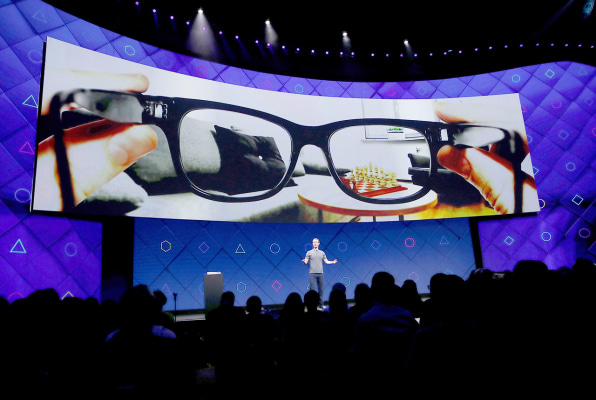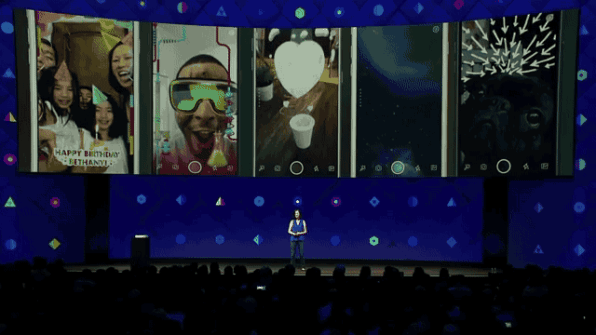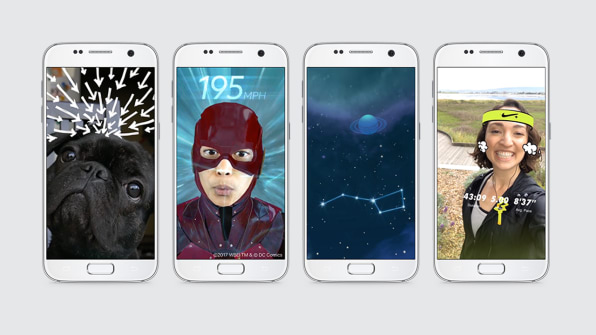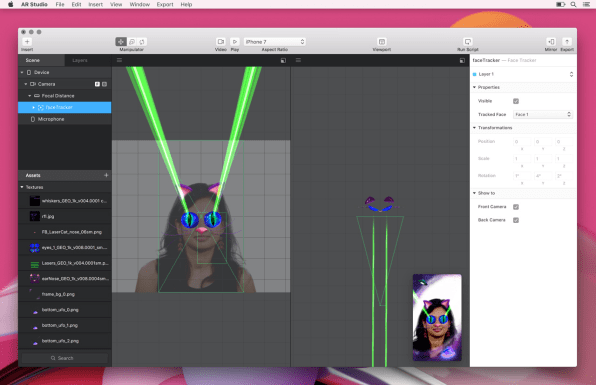Facebook debuted amazing augmented reality technology. Are you ready for Facebook to own your real life, too?
I want to tell you about a world, a magical world, where cartoon sharks circle around your breakfast cereal, everyone you see wears a birthday hat on your big day, and you can point at a bottle of Pinot Noir and get its reviews–maybe even a link to buy it with a tap.

These science fictions are becoming reality thanks to Facebook. At the company’s yearly F8 conference, Mark Zuckerberg and crew showed off the most technically impressive, retina-dazzling demonstrations of augmented reality the world has ever seen, and they did so using nothing more than stock smartphone cameras.It all makes this moment, more than any other in Facebook’s history, the gut check for how deep down the rabbit hole you want to go with this company. Or any company. Because in this new era, Facebook isn’t just hooking you to a feed full of news and baby pictures that you might check dozens of times a day. It’s building a world on top of the one we live in, filled with superimposed friends, objects, and ads that will literally make you see the world through the lens of Facebook.
Though to paraphrase Drake, if you’re reading this it’s too late.

FACEBOOK’S AR REVOLUTION STARTS TODAY
In the last year, augmented reality has grown surprisingly mature. Snapchat has 100 million people who wear zany digital masks in their selfies. Pokémon Go became a cultural phenomenon as people chased virtual monsters through real world streets.
Now at F8, Facebook didn’t do just one single impressive thing with augmented reality, but launched a wide strategy through what it’s calling Camera Effects–a platform that will use augmented reality to snuff out competition, hook users, and woo developers, all at the same time. As Zuckerberg put it himself, “All of the work here will go into the [augmented reality]glasses we all want. This is another step on the path there.”

The newly announced Frame Studio platform allows anyone to make Snapchat-style photo frames. Then, the next stage of Camera Effects is available to developers in a closed beta, known as AR Studio. And that’s when Facebook will accelerate VR to dwarf the capabilities of Pokemon Go and Snapchat. Developers will be able to build AR masks, which will flood the silly-fun market of AR dominated Snapchat, which with a closed filter platform, can’t possibly compete with.

On top of that, however, Facebook will offer other powerful algorithms to developers, which include object recognition, the ability to map a 2D scene as 3D (to create convincing effects in space), and even the option to drop a virtual object in the real world and have it be something other users can see.
This last point sounds like a geeky footnote, and yet, it’s the most potentially impactful of them all. Facebook has previously stated its intent to build a “Metaverse”–a virtual doppelgänger of our world, theorized by author Neal Stephenson. With Camera Effects, Facebook is handing developers the bricks and mortar to build the metaverse, one zany object placed into our world at a time.
THE FACEBOOK WORLD
Zuckerberg offered many scenarios that his company hadn’t built yet, like turning your house into Hogwarts for a child’s birthday party, or buying a $1 virtual TV to hang on your real wall. But the common denominator is that you’d be looking at your reality through the filter of Facebook, your view ever-warped by Facebook’s bubble.

The masks look cute. The games sound fun. But Facebook has a poor history of protecting user privacy. Its algorithms are undoubtedly responsible for the viral spread of misinformation. And ultimately, it is an ad network that generates $27 billion a year by doing things like showing you a pair of shoes that it saw you looking at somewhere else on the web. Creepy!Now consider all of these tricks used for engagement and profiteering applied, not to a web browser or smartphone app, but to your everyday life. The things you really do. The people you really see. The places you really go.

Make no mistake: Whether it’s Microsoft’s Hololens, Snap’s Spectacles, Google’s ill-fated Glass or investment project Magic Leap, or the rumored glasses Apple has prototyped in the past, the entire Valley is in a race for your face, each company wanting to be the information-stuffed contact lens that sits between you and the world your looking at, the ultimate interface of your life. Zuckerberg is simply more open about his intent.However, all of these players are not the same, and we shouldn’t pretend that they are. Facebook, having cut its teeth as a social network urging us to overshare, rather than a quiet operating system respecting the anonymous sanctity of every letter we type, has yet to prove that it has the respect for your personal space in ways that Microsoft, Apple, and even Google are forced to every day. It’s not that these other companies are saints. Microsoft was reportedly the first major company to bow to NSA requests for back doors into your data. Apple tracks beyond-intimate vital information through the iPhone and Apple Watch which third party apps can access. And Google aggregates user patterns, anonymized sure, into data it profits massively from. Everyone wants a piece of you; Facebook is just more intent on sharing it.
–
This article first appeared in www.fastcodesign.com
Seeking to build and grow your brand using the force of consumer insight, strategic foresight, creative disruption and technology prowess? Talk to us at +9714 3867728 or mail: info@groupisd.com or visit www.groupisd.com
